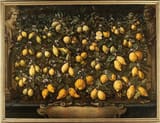Search Results
5/7/2025, 10:16:02 PM
In the end, you acquiesce to Provençal's advise, and assign your lancers and the third skirmishers to the matter of foraging; in the following days, they would depart from the army in all directions, searching for villages and fields where they could find their bounty. They would find some abandoned, bereft of goods and the villagers who had taken them when they fled to avoid the war, but perhaps rich with the produce that was too heavy to be taken still laying in the storehouses.
Some others would be occupied - your men, heavily armed and in great number, would stroll in without issue, demanding the villagers to hand over all that they owned. To refuse would have certainly seen them slaughtered, and so, most complied. Thankfully, your captains have the sense to not burn the village afterwards or to slaughter the populace anyway, holding their men from being taken by their more savage sensibilities and visiting horrors upon the people of the land as is so often common in war.
All such gains, however, paled to your greatest discovery.
In the coastal region of Tilano, the weather was humid and wet, rains becoming more common by the week as summer approached. Inded, that was one thing that worried you, should you take long enough for spring to become summer. During the seasons of rain, roads become awash and turn to mud, sinking wagons and slowing men, making transport a hellish endeavour. Even worse, that cannon which has helped you so during your previous battle would be amidst find the greatest of all hardships. Hugues had warned you with tales of armies losing their entire component of artillery to deep pits of mud and bog, forced to leave them behind for the land to reclaim.
It was in one of these storms that your foraging parties, had veered into a path southwards, deeper into the land and closer to the rivers which your army would later cross on their path. Inbetween the forests, tucked behind a valley, was a large villa, surrounded by miles upon miles of orchards and and plantations, where fruits of all manner grew - Strawberries and blackberries, oranges and watermelons. Some were still early in their growing periods, though still big enough to eat, while others still were ripe for harvest.
To have brought these fruits to the regiment by itself would have been a boon indeed, but something else ocurred instead. The owner of these lands, surely desperate to save his wealth, offered instead a 'better deal'. If his lands were to be left alone by this force, he would sign a monetary note, a document, which would give the bearer access to a considerable sum to be extracted from the bank when he sold the produce in a few months for far more than they could ever taken from the village.
Some others would be occupied - your men, heavily armed and in great number, would stroll in without issue, demanding the villagers to hand over all that they owned. To refuse would have certainly seen them slaughtered, and so, most complied. Thankfully, your captains have the sense to not burn the village afterwards or to slaughter the populace anyway, holding their men from being taken by their more savage sensibilities and visiting horrors upon the people of the land as is so often common in war.
All such gains, however, paled to your greatest discovery.
In the coastal region of Tilano, the weather was humid and wet, rains becoming more common by the week as summer approached. Inded, that was one thing that worried you, should you take long enough for spring to become summer. During the seasons of rain, roads become awash and turn to mud, sinking wagons and slowing men, making transport a hellish endeavour. Even worse, that cannon which has helped you so during your previous battle would be amidst find the greatest of all hardships. Hugues had warned you with tales of armies losing their entire component of artillery to deep pits of mud and bog, forced to leave them behind for the land to reclaim.
It was in one of these storms that your foraging parties, had veered into a path southwards, deeper into the land and closer to the rivers which your army would later cross on their path. Inbetween the forests, tucked behind a valley, was a large villa, surrounded by miles upon miles of orchards and and plantations, where fruits of all manner grew - Strawberries and blackberries, oranges and watermelons. Some were still early in their growing periods, though still big enough to eat, while others still were ripe for harvest.
To have brought these fruits to the regiment by itself would have been a boon indeed, but something else ocurred instead. The owner of these lands, surely desperate to save his wealth, offered instead a 'better deal'. If his lands were to be left alone by this force, he would sign a monetary note, a document, which would give the bearer access to a considerable sum to be extracted from the bank when he sold the produce in a few months for far more than they could ever taken from the village.
Page 1
